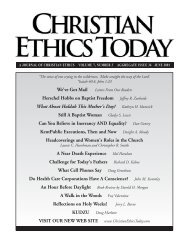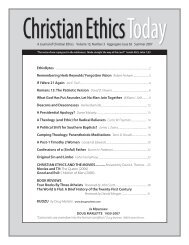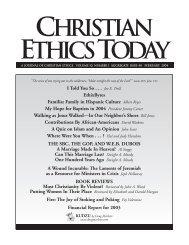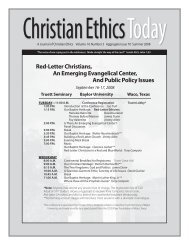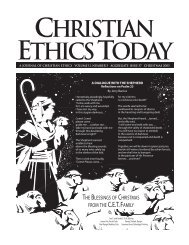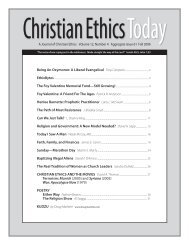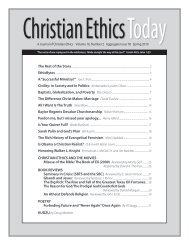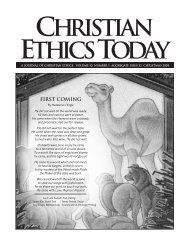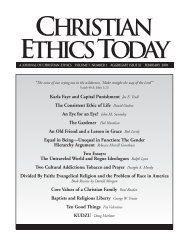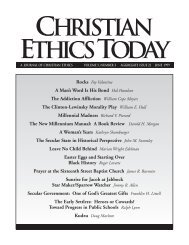Issue 033 PDF Version - Christian Ethics Today
Issue 033 PDF Version - Christian Ethics Today
Issue 033 PDF Version - Christian Ethics Today
Create successful ePaper yourself
Turn your PDF publications into a flip-book with our unique Google optimized e-Paper software.
GWB VISITS FBC<br />
The First Faith-Based Programs Meeting<br />
The picture on the front page of the Austin-American was<br />
eye-catching. President elect George W. Bush in a metal<br />
folding chair, encircled by thirty dignitaries. Behind was a<br />
multi-colored bulletin board emblazoned with pictures of<br />
youth groups, a cross decorated with a fish symbol, posters<br />
advertising “Angels Over Austin,” and names like Mary<br />
Kathryn, Jeff, and Jean. What were these national leaders<br />
doing in the Youth Department of FBC, Austin?<br />
Two days earlier President-elect Bush invited these thirty<br />
ministers and religious leaders to meet with him to discuss his<br />
plans to expand greatly the role of churches and charities in<br />
federal welfare programs. The closed meeting at FBC Austin<br />
lasted more than an hour. Bush reportedly asked the leaders<br />
how his administration should proceed with “faith based” initiatives,<br />
a catch-phrase for providing funds for churches and<br />
private charities to take over government welfare functions<br />
and for using tax breaks and incentives to spur charitable<br />
donations.<br />
In less than one month after taking his oath, President Bush<br />
created a White House Office of Faith Based Action, which<br />
would “encourage religious institutions to compete to run<br />
drug, poverty, and other social programs now administered by<br />
government agencies.” Many religious leaders expressed concern,<br />
fearing the office will lead to government interference<br />
with their ministries, favor politically-connected ministers, and<br />
will violate the separation of church and state by providing government<br />
funds for what amounts to proselytizing.<br />
The day after the meeting at FBC, Austin, the Editor had<br />
lunch with the pastor, Dr. Roger Paynter and one of his members<br />
(and one of our favorite writers), attorney Hal Haralson.<br />
The discussion was most interesting. As pastor of the church,<br />
Roger was invited to attend the entire meeting, which was<br />
closed to the press. The story of how this meeting came to be<br />
held at FBC, plus many behind-the-scene details, make this<br />
interview interesting as well as vital for understanding<br />
President Bush’s proposal.<br />
Editor: Why and when did then Governor Bush choose<br />
FBC for the meeting?<br />
Paynter: There has never been a clear reason given for their<br />
choice, other than the fact that he was in Austin during the<br />
transition, we are a downtown church, he has been to First<br />
Baptist on one other occasion, and we have long been<br />
involved in providing ministry to the downtown area. Or, it<br />
could simply have been that First Methodist was booked!<br />
6 • APRIL 2001 • CHRISTIAN ETHICS TODAY<br />
An Interview with Dr. Roger Paynter<br />
Pastor of First Baptist Church, Austin, Texas<br />
Q. Who chose the Youth Assembly Room for the meeting<br />
and what preparations were made?<br />
A. Members of the Bush “advance team” came to our building<br />
and chose that room because it was bright, colorful, focused<br />
on youth and had more potential for a good “photo op.”<br />
Three different people came at three different times during<br />
the 24 hours prior to the meeting and met with out Minister<br />
to Students, Kevin Mitchell. Each person had a different idea<br />
about how the room should be arranged, which included<br />
moving furniture several times, painting the main wall, covering<br />
the wall with different posters and pennants, etc. Kevin<br />
worked with the Bush team until 11:00 p.m. on Tuesday<br />
evening only to have them come on Wednesday morning,<br />
change their minds and rearrange the room one more time.<br />
Several times Kevin had to remind them that this room<br />
belonged to our youth group, that our youth had picked out<br />
the color schemes and decorations and that it could not be<br />
severely altered for photo opportunities.<br />
Q. When President elect Bush arrived, did you greet him?<br />
A. The Secret Service came and got me from my office exactly<br />
six minutes before Mr. Bush arrived and briefed me on what<br />
to say. The remainder of our staff was sequestered in the office<br />
under the supervision of the Secret Service. When the motorcade<br />
pulled up to the front door, I walked out and said, “Mr.<br />
President-elect, my name is Roger Paynter and I want to welcome<br />
you to First Baptist Church.” Before I could finish,<br />
Bush replied, “Yes, I know who you are. We met last year at<br />
the Martin Luther King service at Central Presbyterian. You<br />
had to read that difficult passage of scripture about the genealogy<br />
of Jesus and I told you then that I was impressed that you<br />
got through all those names without stumbling.” That was<br />
impressive and caught my attention. I then asked him if he<br />
was ready to go upstairs for the meeting and he said, “In a<br />
minute. It looks like the Secret Service has your staff held<br />
hostage. Let’s go liberate them.” And he proceeded to cross<br />
our atrium into the office where he talked with every member<br />
of our staff, shaking hands and signing a few autographs. He<br />
was personable and engaging and in that moment I think the<br />
members of my staff who voted for Al Gore would have<br />
changed their vote!<br />
Q. Who were some of the religious leaders present? Were<br />
evangelicals represented?<br />
A. Bishop Fiorenza, President of the U.S. Catholic Bishops



